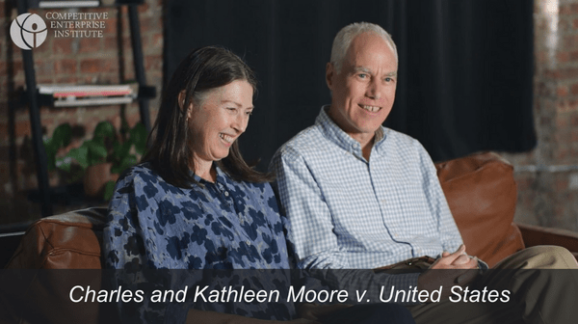Washington Couple Challenging Federal Shareholder Tax Petition Supreme Court to Take Up Their Case

Photo Credit: Getty
Kathleen and Charles Moore, a Washington state couple challenging a 2017 tax on their shares in a foreign company, petitioned the Supreme Court today to review lower court decisions upholding the unconstitutional tax.
In 2006, the Moores made an investment to help launch an overseas company formed by a friend to empower India’s underserved rural farmers. The company, called KisanKraft, supplies power tools to small-scale, individual Indian farmers with the aim of making their operations more productive. KisanKraft met a real need, and has expanded to serve farmers across India. It fueled that growth by reinvesting its profits; the Moores have never received a dime from their investment.
As the Moores explained in a recent Competitive Enterprise Institute video, the Tax Cuts and Jobs Act of 2017 left them with a tax bill of almost $15,000 for their share of KisanKraft’s reinvested profits—money that they never received and that isn’t even available at this point. The Act, however, declared that money to be the Moores’ “income” and then taxed them on it, based on the fact that they owned shares in the company. The Moores went to court to obtain a refund, arguing that the tax is not an income tax but a tax on property, which the Constitution requires to be apportioned among the states by population, which this tax is not.
“The Constitution requires all direct taxes that are not income taxes to be proportionally levied on the population of each state – and what we have here is a direct tax that is neither an income tax nor a proportionally levied tax,” said CEI General Counsel and co-counsel to the Moores Dan Greenberg. “The Moores did not receive a dime in income from their investment in a small India-based company that provides power tools for small-scale farmers, so how can they be legally made to pay income tax? We hope the Supreme Court will agree to hear this challenge to a striking assertion of new tax powers by the federal government.”
Last year, the U.S. Court of Appeals for the Ninth Circuit issued a decision upholding the tax. It concluded that “nothing prohibits Congress from “attributing a corporation’s income pro-rata to its shareholders” and then taxing them on it.” The court then denied the Moores’ request for rehearing by the full Ninth Circuit. Four judges dissented, arguing that the Ninth Circuit had “become the first court in the country to state that an ‘income tax’ doesn’t require that a ‘taxpayer has realized income’ under the Sixteenth Amendment.” The panel decision, they concluded, “open[s] the door to expansion of the federal taxing power beyond the limits placed by the Constitution,” including “taxes on all sorts of wealth and property without the constitutional requirement of apportionment.”
Later this year, the Supreme Court will announce which cases they will hear in the next term.
For more information on Moore v U.S., please visit cei.org/moorevus.
Visit CEI’s Moore v. U.S. case page to read proceedings and orders:
https://cei.org/court_case/charles-and-kathleen-moore-v-united-states/
Read more:
- New Video: Kathleen and Charles Moore on Why the Supreme Court Should Hear their Challenge to Tax on Unrealized Gains
- Andrew Grossman and David Rivkin for the Wall Street Journal: Can Congress Tax Wealth by ‘Deeming’ It Income?
- Ninth Circuit Refuses to Reconsider Allowing Wealth Taxes
More on Moore: A History of Direct Taxes and their Application to Moore v. United States